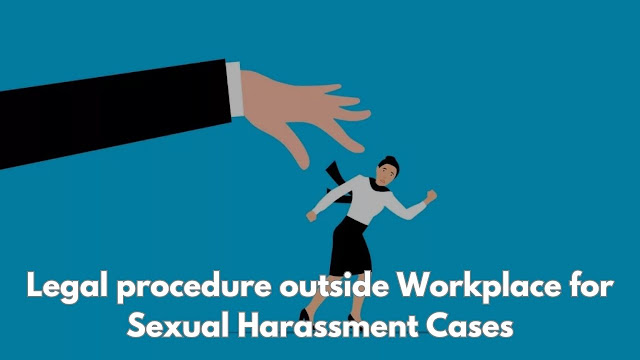Legal procedure outside Workplace for Sexual Harassment Cases
 |
| Legal procedure outside Workplace for Sexual Harassment Cases |
The Sexual Harassment of Women at Workplace (Prevention, Prohibition and Redressal) Act, 2013, requires employers to adhere to measures to prohibit and prevent sexual harassment of women at work and, in particular, to establish an internal committee ("IC") for the resolution of complaints. The mandate aims to hold employers accountable for giving women a safe and respectable working environment.
In addition to the IC, legal procedures outside of the workplace can also be used to escalate problems. This may be done as a result of workplace or IC noncompliance with the law, or concurrently with any workplace escalation. Following is a discussion of some methods of such escalation outside of the workplace:
Suit for compensation before a Civil Court
Can order for compensation in cases of confidentiality breach and follows the same procedure as regular civil cases with evidence and arguments from both sides. Enraged parties have also filed defamation cases for false complaints.
Petition for a writ before the high court
Can make an order of Mandamus (direct workplaces to set up an IC where it does not exist), or follow any provision of the law, in the case that the workplace is a PSU or government department or organization. Can make an order of Certiorari (review of an Order made by the IC), wherein it can quash the Report and order for re-inquiry.
Criminal Complaints
For offences such as outraging modesty, sexual harassment, voyeurism, and stalking, a FIR must be filed against the perpetrator under any or all subsections of Section 354 IPC.
POSHADVO
- https://poshadvo.com/
- https://poshadvo.com/employees-training-awareness/
- https://poshadvo.com/about-the-law/
- https://poshadvo.com/policy-and-process/
- https://poshadvo.com/functioning-as-external-member/
- https://poshadvo.com/about-us/
- https://poshadvo.com/contact-us/
- https://poshadvo.com/careers/
- https://poshadvo.com/sectors-serviced/
- https://poshadvo.com/regulatory-compliance/
- https://poshadvo.com/advisory-support/
- https://poshadvo.com/cookies-policy/
- https://poshadvo.com/counselling-program/
- https://poshadvo.com/faqs/
- https://poshadvo.com/privacy-policy/

Comments
Post a Comment